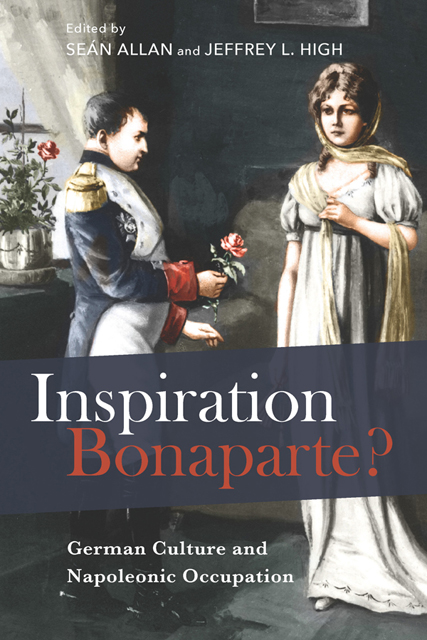12 - “We are all possessed!” Napoleon and Inspiration in German Naturalist Drama
Published online by Cambridge University Press: 04 January 2024
Summary
In this essay I examine Napoleon Bonaparte (1769–1821) as an inspirational figure in German culture through three dramas from the two decades around 1900 that explore Napoleon’s own inspiration, his inspiration of others, and the problematic nature of these motivations: the three act Wehe den Besiegten (Woe to the Vanquished, 1889), by Richard Voß (1851–1918), Napoleon (1906), by Emil Ludwig (1881–1948), and the two-part Napoleon Bonaparte of 1911 by Carl Hauptmann (1858–1921). All three dramas draw on the reputation of Napoleon as an effective and charismatic leader, and against this background not only offer critical portrayals of him as an historical personality but also reflect on the complex and volatile nature of inspiration and charisma. Voß’s Wehe den Besiegten presents Napoleon’s charisma as real, but ultimately the dangerous outcome of fanaticism in his followers; in Ludwig’s drama, Napoleon’s visionary charisma is not a natural expression of genius but hard-nosed political calculation; in Hauptmann, Napoleon’s charisma is undeniable, but his success owes much to those around him and he is haunted by madness.
Though these dramas are not well-known, they have been seen as representative of Napoleon’s literary reception in the wake of Friedrich Nietzsche (1844–1900). Scholarship on the reception of Napoleon in the latter part of the nineteenth century has tended to focus on the presentation of Bonaparte as a Nietzschean superman. Leaving aside the question as to whether Nietzsche himself considered Napoleon in this way, this view has much to recommend it. Karl Bleibtreu (1859–1928), who made a career out of writing books, essays, and plays about the Napoleonic age, supplies the signature note here, with his drama, Der Übermensch (The Superman, 1896). As early as 1904 Samuel Lublinski (1868–1910) recalled in his Bilanz der Moderne (Summary of Modernism) that the public in the age of Naturalism yearned for a hero as reaction to the Naturalists’ dogmatic focus on milieu, prompting a naïve longing for individualism, to which Nietzsche gave the theory and the by-word Übermensch:
So begann eine verwegene individualistische Schwelgerei, die sich bis zum phantastischen Taumel und zu rauschenden Orgien steigerte. Erst in der zweiten Hälfte der neunziger Jahre hatte Nietzsche vollständig gesiegt, und alle Literaturcafés in Berlin, München, Wien und noch in ein paar anderen Großstädten, wimmelten damals von “Übermenschen.”
- Type
- Chapter
- Information
- Inspiration Bonaparte?German Culture and Napoleonic Occupation, pp. 261 - 279Publisher: Boydell & BrewerPrint publication year: 2021



